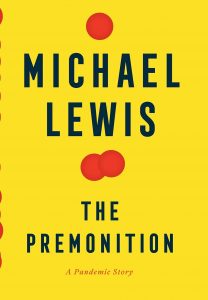Published by Allen Lane UK/Norton US 4 May 2021
320pp, hardback, UK £25/ US $30
Reviewed by N.J. Cooper
Reading any of Michael Lewis’s brilliant accounts of mismanagement and the mavericks who understand it and see further into a better future than anyone else, making sense of both triumph and disaster, I am often remind of Warren Buffett. Buffett makes no secret of the methods he uses to choose his investments and so you’d have thought every stock picker in the world would copy those methods and become as successful, but of course they don’t and aren’t.
Michael Lewis lays bare his own strategy in the introduction to this magnificent account of the thinkers and scientists who knew a pandemic would come and tried to make successive American governments prepare for it, while being stymied over and over again by organizations and individuals with other agenda. He writes: ‘A freshly mutated virus in China made its way towards the United States. This was just the sort of management test I’d imagined when writing The Fifth Risk. How could I not write about it? But as I got into it, and found these wonderful characters to tell the story through…’ No one else writing serious, popular non-fiction manages to follow Lewis in finding ‘marvellous characters’ and using their stories to analyze complex subjects. I can’t think why not. It works.
Here Lewis’s characters include: Laura Glass, a thirteen-year-old with a powerful interest in both science and computer modelling; Doctor Charity Dean, chief health officer for Santa Barbara County, who ‘from a very young age, when she was feeling low …cheered herself up by reading books on bubonic plague. The ones with the grisly drawings she liked best.’; Rajeev Venkayya and Richard Hatchett, who both worked for the White House and ‘thought the United States government was paying too much attention to the threats posed by people and too little by those posed by nature.’; Joe DeRisi, who ‘thought scientists should be encouraged to look at stuff without having any idea of what they were looking for’ and who found crucial ‘stuff’ about the behaviour of viruses and how to assess them. And so it goes on. These people and many others join together in their attempts to understand and mitigate the effects of the pandemic they knew would come.
Michael Lewis explains their characters, interests and backgrounds, the papers they write and the work that they do in the easiest of prose, bringing exactly the right personal details to make the stories sing. He is funny, angry, and acute. As a reviewer, I find myself wanting to quote practically every other sentence in the book. In the introduction he writes that he wants readers to decide whether there are implications in his story that he has missed. I am sure he hasn’t missed anything but what I take from it, apart from knowing more about viruses in general and Covid-19 in particular, and his extraordinary characters, is that our societies need to value real, evidence-based knowledge higher than anything else because it is beyond price. We need to listen to those mavericks and oddballs who are too modest and interested in their arcane subjects to thrust themselves on to public stages. We need to challenge group think and what Lewis unforgettably describes as ‘bureaucrats who suffer from malignant obedience’. We need to be less frightened of getting something wrong than doing nothing at all.
Sprinkled through this fascinating study of brilliance and its frustration are snippets that should be read – and heard – by anyone in any kind of management anywhere: the fact that in most companies ten per cent of the people do ninety per cent of the work; that those who really understand why something is going wrong are at level six in their organizations, a long way below the policy-makers and the million-dollar earners; that damage can be done by promoting the wrong people, even in the interests of e.g. diversity; and that people convinced of their own virtue can be the most dangerous of all. When Charity Dean was at medical school, members of the church to which she had belonged since childhood, were outraged that she had come top of her year; they believed that ‘ “I should be at the fiftieth percentile of my class. No better.” ’
The Premonition offers many different angels and devils. Readers will swing from astonished admiration to sickening rage again and again, but Charity Dean’s church’s attempt to impose ignorance and failure on such a star, who has so much to offer, summed up for me everything that is wrong with the world. Thank goodness that it also has Michael Lewis in it and the whole cast of extraordinary characters to which he introduces us in his latest masterpiece.

